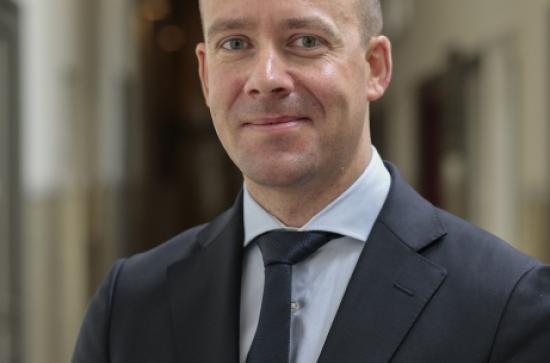Michael J. Geary

I think there were so many. Getting elected as Finance Officer of the SU when I began my third year of the BA was one; it was a fun but exhausting campaign. Student politics is not for the faint-hearted! Handing in my completed 100,000 word M.LITT. history thesis in 2004 was another. Meeting and making lifelong friends.
I was the first elected Finance Office of the NUIM Students Union in 2002-03 after the role was newly developed. I also served as the student representative for the English undergraduate students.
I loved being able to study History, English and Biology, my three passions, in the first year of the BA (I subsequently majored in History and English in years 2 and 3). That was unique at the time. The quality and depth of the supervision and feedback I got during my research masters made me a better researcher and in later years has made me a better supervisor. The campus is one of the unique selling points. There is a calm tranquility about it that helps during exam season yet Maynooth is so well connected. I liked that contrast.
I developed a passion for literature studying English and I frequently add English lit. to my readings lists in the history courses, like Doris Lessing's work. History and English is the perfect combination especially in providing me with an interdisciplinary perspective on issues like decolonization. In the History Department, I was given the tools to be a professional researcher, to use archives, think critically, and to be more analytical. Seeing how other lecturers lectured, I found myself in later years using them as role models especially in how to be a very good research supervisor myself.
Just do it. For me, studying at MU was an affirming experience. I had excellent lecturers in the History and English Departments and even though I did Biology for the first year of my BA (it was my third subject), I was thoroughly impressed with the quality of scientific staff and their ability not only to lecture but also with critically engaging with us as students. It is also one of my favourite university campuses. I think I did so well at MU largely because of its location that gave me the space to focus on my studies. I also met the best friends; some really lovely people. It was my first choice on my CAO form and if I had to do it all over again, it would still be.
After I graduated in 2004 with my M.LITT. in modern history, I took a year out and in 2005 began my Ph.D. in History at the European University Institute in Florence, Italy. I finished in early 2009 and worked briefly at the EU Council of Ministers in Brussels before starting an academic position at Maastricht University in the Netherlands. Inter alia, I had really exciting research fellowships/visiting professorships in Switzerland, Poland and in the US as a Fulbright-Schuman professor, Ireland's first recipient of that award in EU-US relations. In 2018, I moved to Norway to take up an associate professorship in Mondern History and a year later I was promoted to full professor. At NTNU, beyond lecturing, I serve as director of European Studies.
It's hard to single out one highlight but certainly finishing my M.LITT is one of them. I had a really great supervisor and I loved the topic (an analysis of Ireland's attempts to join the EEC during the 1960s). I subsequently revised it and published it as my first monograph in 2009. the M.LITT. gave me really vital research skills that made me so much better prepared for the Ph.D. when I started at the EUI. I'm still incredibly proud of that degree.
When I'm not cross-country skiing or on my paddle-board on the fjord, I'm at my office at NTNU, Norway's largest university where I lecture in the BA and MA degrees in History, History with Teacher Education and the BA/MA in European Studies. I also supervise research dissertations at all levels including a Ph.D student working on British foreign policy towards South Africa during the 1970s-80s. I am also the academic programme director for European Studies.
I really love thesis supervision, seeing the students develop research probelems and doing some exciting research. In teaching, especially my course on globalizing the Cold War, I really like the student interaction and the level of engagement.
Through a friend who suggested that I should consider applying, so I did.
Remember all the soft/generic skills you acquired during your studies and make sure you make these prominent in your CV. Far too often, we tend to under sell our abilities and skillset. I feel incredibly luckly to be where I am in academia and I know it is not easy to get a permanent job. Keep trying and publish as much as you can. Cold call universities via email and ask if they have teaching gaps/courses that need to be taught. Be proactive. Be positive even if it's hard.
